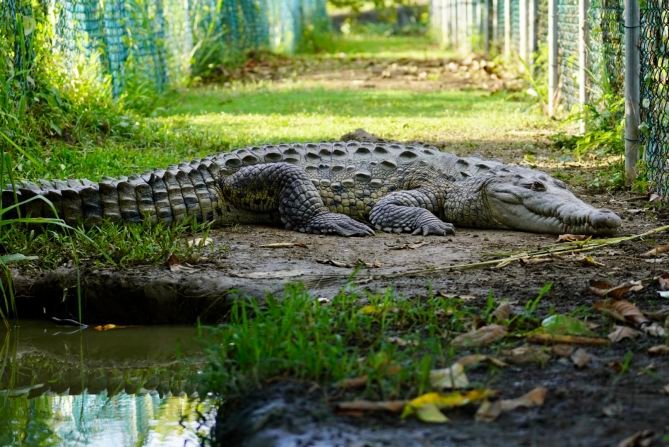In the quiet mangrove swamps of Jamaica, where the stillness is broken only by the occasional splash or rustle of leaves, a silent battle is being fought—not between man and beast, but for the very survival of one of the island’s most misunderstood creatures. Jamaica’s Crocodile Guardian stands at the center of this struggle, a man driven by passion, courage, and a deep respect for the natural world.
This is the story of one individual’s mission to protect the American crocodile, a feared predator whose reputation overshadows its vital role in Jamaica’s delicate ecosystem.
Who Is Jamaica’s Crocodile Guardian?
Meet the Man Behind the Mission
Jamaica’s Crocodile Guardian is more than just a title—it represents a life dedicated to conservation. Born and raised near the wetlands of southern Jamaica, he grew up observing the powerful presence of crocodiles in the wild. While most children learned to fear them, he was captivated by their strength and survival instincts.
Initially, with no formal training, he began his work as a volunteer, rescuing stranded or injured crocodiles from urban areas. Over time, his knowledge, skills, and reputation grew, earning him the title of the island’s foremost crocodile protector.
Passion Turned Purpose
What began as fascination soon became purpose. Encounters with wounded animals, stories of poached crocodiles, and watching their habitats shrink lit a fire in him. He realized that someone had to stand up for these ancient creatures—someone who understood their behavior and believed they deserved to exist.
The Plight of Jamaica’s Crocodiles
Misunderstood and Feared
Despite being a protected species, crocodiles in Jamaica are often seen as monsters. Tales of attacks and urban legends have fueled fear and hostility for generations. But these creatures rarely pose a threat unless provoked or cornered. Jamaica’s Crocodile Guardian spends much of his time dispelling myths, explaining that crocodiles are shy, territorial, and more afraid of humans than we are of them.
Threats to the Species
Their biggest threats aren’t natural—they’re man-made. Coastal development is rapidly destroying nesting grounds. Poaching, driven by illegal meat trade and superstition, continues despite legal protections. And as human settlements expand, so do conflicts between people and crocodiles, often resulting in the animal’s death.
Conservation in Action: How Jamaica’s Crocodile Guardian Is Making a Difference
Rescue, Rehabilitation, and Release
Whether it’s a crocodile trapped in a construction site or injured by fishing gear, Jamaica’s Crocodile Guardian is often the first on the scene. With care and caution, he captures the animals, treats their injuries, and, when possible, returns them to the wild. His methods are humane, and his techniques are informed by years of firsthand experience.
Community Outreach and Education
Changing public perception is a cornerstone of his mission. He regularly visits schools to educate children about crocodiles and the importance of environmental conservation. Through public talks and social media, he promotes coexistence and respect. His message is simple but powerful: protecting crocodiles is not just about saving a species—it’s about preserving an ecosystem.
Collaborating with Conservation Groups
Jamaica’s Crocodile Guardian works with local NGOs, wildlife authorities, and researchers to study crocodile behavior and improve conservation strategies. His field knowledge complements scientific efforts, resulting in better outcomes for both wildlife and communities.
The Broader Impact of the Guardian’s Work
Changing Hearts and Minds
Perhaps the most remarkable part of his mission is its ripple effect. Residents once fearful of crocodiles now call him for help instead of taking matters into their own hands. Tourists visit mangrove areas not to hunt, but to learn. Young Jamaicans are starting to see these reptiles not as monsters, but as symbols of resilience and natural heritage.
Environmental Ripple Effects
Protecting crocodiles helps protect the wetlands they call home—ecosystems that support fish, birds, and vegetation crucial to Jamaica’s environmental health. As apex predators, crocodiles keep populations in balance and maintain the integrity of their habitat.
Challenges Faced by Jamaica’s Crocodile Guardian
Navigating Danger and Resistance
His work is not without risk. Some rescues involve wading into crocodile-infested waters. Others mean facing angry locals who want the animals gone. Despite the dangers, he remains committed, believing that fear can be overcome with education and empathy.
Funding and Resource Limitations
Operating largely on donations and volunteer support, Jamaica’s Crocodile Guardian often struggles with limited resources. Equipment, transportation, and medical supplies for animals are always in short supply. But what he lacks in funding, he makes up for in grit and determination.
The Future of Jamaica’s Crocodile Guardian and the Species He Protects
Vision for Long-Term Impact
Looking ahead, Jamaica’s Crocodile Guardian envisions a future where education is widespread, crocodile habitats are legally protected, and human-crocodile conflict is rare. He’s working on programs to restore degraded mangrove areas and push for stronger wildlife legislation.
How You Can Help
You don’t have to be in Jamaica to make a difference. Share his story. Support wildlife organizations. Educate others about the importance of predators in nature. And if you’re visiting Jamaica, consider an eco-tour that supports conservation efforts rather than exploiting wildlife.
Conclusion
Jamaica’s Crocodile Guardian is a testament to the power of one person to inspire change. In a world where fear often drives destruction, his story is one of courage, compassion, and coexistence. By protecting Jamaica’s most feared predators, he’s preserving not just a species, but the soul of an island.
Don’t Miss Out! Get the Latest News, Tips, and Updates from Us!
